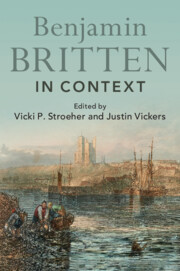Book contents
- Benjamin Britten in Context
- Composers in Context
- Benjamin Britten in Context
- Copyright page
- Dedication
- Contents
- Figures
- Tables
- Notes on Contributors
- Acknowledgements
- Bibliographic and In-Text Abbreviations
- Prologue
- Part I The Britten Circle(s)
- Part II British Musical Life
- Part III Britten and Other Composers
- Part IV Wordsmiths, Designers, and Performers
- Chapter 24 W. H. Auden
- Chapter 25 Eric Crozier
- Chapter 26 Two Librettists
- Chapter 27 The Wise, Queer Heart of Englishness
- Chapter 28 William Plomer’s Poetics of Exile at Home
- Chapter 29 ‘Don’t Colour Them, the Music Will Do That’
- Chapter 30 Designing and Dancing Britten
- Chapter 31 Pears as Illuminator, Interpreter, and Inspiration
- Chapter 32 Britten’s Singers
- Chapter 33 Britten’s Performers: Those Most ‘Instrumental’
- Part V British Sociocultural, Religious, and Political Life
- Further Reading
- Index
Chapter 28 - William Plomer’s Poetics of Exile at Home
from Part IV - Wordsmiths, Designers, and Performers
Published online by Cambridge University Press: 31 March 2022
- Benjamin Britten in Context
- Composers in Context
- Benjamin Britten in Context
- Copyright page
- Dedication
- Contents
- Figures
- Tables
- Notes on Contributors
- Acknowledgements
- Bibliographic and In-Text Abbreviations
- Prologue
- Part I The Britten Circle(s)
- Part II British Musical Life
- Part III Britten and Other Composers
- Part IV Wordsmiths, Designers, and Performers
- Chapter 24 W. H. Auden
- Chapter 25 Eric Crozier
- Chapter 26 Two Librettists
- Chapter 27 The Wise, Queer Heart of Englishness
- Chapter 28 William Plomer’s Poetics of Exile at Home
- Chapter 29 ‘Don’t Colour Them, the Music Will Do That’
- Chapter 30 Designing and Dancing Britten
- Chapter 31 Pears as Illuminator, Interpreter, and Inspiration
- Chapter 32 Britten’s Singers
- Chapter 33 Britten’s Performers: Those Most ‘Instrumental’
- Part V British Sociocultural, Religious, and Political Life
- Further Reading
- Index
Summary
This essay summarises the working relationship between composer Benjamin Britten (1913–76) and writer William Plomer (1903–73). After listing their completed collaborations – Gloriana (1953), Curlew River (1964), The Burning Fiery Furnace (1966), The Prodigal Son (1968) – and abandoned projects, the essay turns to broader points of comparison and particularly to Britten and Plomer’s shared sense of ‘exile’, which the author argues informs their independent and collaborative work. Plomer’s shift away from the novel as a genre parallels Britten’s away from full-length opera. Their choice of subject, particularly in their work together, shows a movement away from realism. They cultivate a sense of humour marked by irony, and they increasingly pursue an economy of artistic material. These shared traits may point to the artists’ sense of ‘estrangement’ and may also be indicators of ‘late style’.
Keywords
- Type
- Chapter
- Information
- Benjamin Britten in Context , pp. 249 - 255Publisher: Cambridge University PressPrint publication year: 2022

